| Listing 1 - 5 of 5 |
Sort by
|
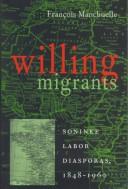
ISBN: 0821412027 0821412019 Year: 1997 Publisher: Athens Ohio University Press
Abstract | Keywords | Export | Availability | Bookmark
 Loading...
Loading...Choose an application
- Reference Manager
- EndNote
- RefWorks (Direct export to RefWorks)
#SBIB:39A73 --- #SBIB:39A4 --- #SBIB:96G --- Etnografie: Afrika --- Toegepaste antropologie --- Geschiedenis van Afrika --- Soninke (African people) --- Employment --- Migrations. --- Aswanik (African people) --- Dyakanke (African people) --- Gadyaga (African people) --- Marka (West African people) --- Saracole (African people) --- Sarakole (African people) --- Sarawule (African people) --- Serahuli (African people) --- Silabe (African people) --- Toubakai (African people) --- Wakore (African people) --- Ethnology --- Migrations
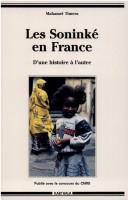
ISBN: 2865377016 Year: 1996 Volume: *39 Publisher: Paris Karthala
Abstract | Keywords | Export | Availability | Bookmark
 Loading...
Loading...Choose an application
- Reference Manager
- EndNote
- RefWorks (Direct export to RefWorks)
Soninke (African people) --- Soninke (Afrikaans volk) --- Soninke (Peuple africain) --- #SBIB:39A73 --- #SBIB:39A6 --- #SBIB:39A72 --- Etnografie: Afrika --- Etniciteit / Migratiebeleid en -problemen --- Etnografie: Europa --- France --- Emigration and immigration --- Civilization --- American influences --- Africans --- Immigrants --- Islam --- Aswanik (African people) --- Dyakanke (African people) --- Gadyaga (African people) --- Marka (West African people) --- Saracole (African people) --- Sarakole (African people) --- Sarawule (African people) --- Serahuli (African people) --- Silabe (African people) --- Toubakai (African people) --- Wakore (African people) --- Ethnology --- Emigrants --- Foreign-born population --- Foreign population --- Foreigners --- Migrants --- Persons --- Aliens --- Cultural assimilation --- Services for --- Ethnic identity
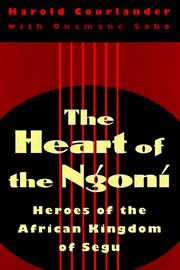
ISBN: 1122053932 0585200831 9780585200835 0870239295 9781122053938 Year: 1994 Publisher: Amherst, Mass. University of Massachusetts Press
Abstract | Keywords | Export | Availability | Bookmark
 Loading...
Loading...Choose an application
- Reference Manager
- EndNote
- RefWorks (Direct export to RefWorks)
Bambara (African people) --- Soninke (African people) --- Legends --- Tales --- Folklore --- Anthropology --- Social Sciences --- Folk tales --- Folktales --- Folk literature --- Traditions --- Urban legends --- Aswanik (African people) --- Dyakanke (African people) --- Gadyaga (African people) --- Marka (West African people) --- Saracole (African people) --- Sarakole (African people) --- Sarawule (African people) --- Serahuli (African people) --- Silabe (African people) --- Toubakai (African people) --- Wakore (African people) --- Ethnology --- Bamana (African people) --- Bamanakan (African people) --- Bambara tribe --- Banmana (African people) --- Banmanan (African people) --- Banmani (African people) --- Mandingo (African people) --- Folklore. --- Ségou (Mali : Région) --- Région de Ségou (Mali) --- Segu (Mali : Région) --- History.
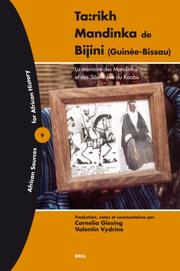
ISSN: 15676951 ISBN: 1281925845 9786611925840 9047420705 9789047420705 9789004147249 9004147241 Year: 2007 Volume: v. 9 Publisher: Leiden Boston Brill
Abstract | Keywords | Export | Availability | Bookmark
 Loading...
Loading...Choose an application
- Reference Manager
- EndNote
- RefWorks (Direct export to RefWorks)
Ce tome présente le Ta:rikh Mandinka, un manuscrit rédigé en Arabe et en Mandinka, originaire du village de Bijini en Guinée-Bissau. Inédit jusqu’à présent, le manuscrit consiste en une compilation structurée et très originale sur le Kaabu, réunissant divers récits et chroniques focalisant les débuts mythiques et la chute de cet « empire » païen au milieu du 19ième siècle. Deux versions du manuscrit et plusieurs interprétations (lectures) du Ta:rikh sont reproduites, transcrites, traduites et analysées en tenant compte de questions philologiques, historiques et anthropologiques. L'analyse regarde la communauté cléricale de Bijini en tant que lieu de transmission de savoirs dans un contexte local et régional. Le point focal du livre est l’importance de la diaspora cléricale des Mandinka et Jaakanka (Jakhanké) dans le processus de la construction de l’histoire de l’ « empire » sòoninkee du Kaabu en Sénégambie. Le tome contient un glossaire des noms et des termes mentionnés par les sources, des illustrations, des tableaux, des cartes et des photographies. This volume presents a hitherto unpublished manuscript written in Arabic and Mandinka from the Muslim village of Bijini in Guinea-Bissau, the Ta:rikh Mandinka, a unique and structured compilation unfolding the pagan 'empire' of Kaabu from its mythical beginnings to its downfall in the nineteenth century. Two existing manuscript versions and several oral interpretations of the Ta:rikh are reproduced, transcribed, translated, compared and analysed considering philological, historical and social-anthropological issues (chaps. 1-3). The fourth chapter deals with the clerical community of Bijini as a place of knowledge-transfer in its local setting and within regional networks. The focus of the book is on the importance of the Mandinka and Jakhanka clerical diaspora in the making of the history of the Sooninkee 'empire' of Kaabu in Senegambia. The volume contains a glossary of names and terms mentioned in the sources and is illustrated with maps, photographs and drawings.
Mandingo (African people) --- Soninke (African people) --- Aswanik (African people) --- Dyakanke (African people) --- Gadyaga (African people) --- Marka (West African people) --- Saracole (African people) --- Sarakole (African people) --- Sarawule (African people) --- Serahuli (African people) --- Silabe (African people) --- Toubakai (African people) --- Wakore (African people) --- Ethnology --- Malinke (African people) --- Mandé (African people) --- Manding (African people) --- Mandingue (African people) --- Mandinka (African people) --- Mandino (African people) --- Maninka (African people) --- Maninkaalu (African people) --- Soce (African people) --- Sosse (African people) --- History. --- Social life and customs. --- Bijine (Guinea-Bissau) --- Kaabu Empire --- Gabou (Kingdom) --- Gabu Empire --- Bijini (Guinea-Bissau) --- Mandingo (African people) - Guinea-Bissau - Bijine - History. --- Mandingo (African people) - Guinea-Bissau - Bijine - Social life and customs. --- Soninke (African people) - Guinea-Bissau - Bijine - History. --- Soninke (African people) - Guinea-Bissau - Bijine - Social life and customs. --- Kaabu Empire - History. --- Bijine (Guinea-Bissau) - History. --- Bijine (Guinea-Bissau) - Social life and customs.
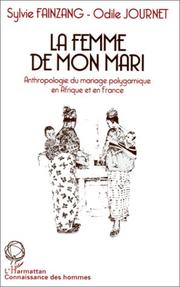
ISBN: 2858029873 9782858029877 Year: 1988 Publisher: Paris : L'Harmattan,
Abstract | Keywords | Export | Availability | Bookmark
 Loading...
Loading...Choose an application
- Reference Manager
- EndNote
- RefWorks (Direct export to RefWorks)
392.4/.5 --- Polygamy --- -Polygamy --- -Toucouleurs --- -Soninke (African people) --- -Toucouleur (African people) --- -Futanke (African people) --- Futankobe (African people) --- Futankoobe (African people) --- Haal Pulaaren (African people) --- Haalpulaar (African people) --- Hal-Pularen (African people) --- Halpulaar (African people) --- Pulaar (African people) --- Takarir (African people) --- Tekarir (African people) --- Tekrouriens (African people) --- Tokolor (African people) --- Tokoror (African people) --- Tooroobe (African people) --- Torado (African people) --- Torodo (African people) --- Toucouler (African people) --- Toucouleur (African people) --- Toucouleurs --- Tuculeur (African people) --- Tukolor (African people) --- Tukuler (African people) --- Tukuleur (African people) --- Turkylor (African people) --- Ethnology --- Fula (African people) --- Aswanik (African people) --- Dyakanke (African people) --- Gadyaga (African people) --- Marka (West African people) --- Saracole (African people) --- Sarakole (African people) --- Sarawule (African people) --- Serahuli (African people) --- Silabe (African people) --- Toubakai (African people) --- Wakore (African people) --- Multiple marriage --- Plural marriage --- Marriage --- Non-monogamous relationships --- 392.4/.5 Verloving. Huwelijk. Huwelijksgebruiken. Partnerkeuze. Polyandrie. Polygamie. Monogamie --- Verloving. Huwelijk. Huwelijksgebruiken. Partnerkeuze. Polyandrie. Polygamie. Monogamie --- Cross-cultural studies --- Marriage customs and rites --- -392.4/.5 Verloving. Huwelijk. Huwelijksgebruiken. Partnerkeuze. Polyandrie. Polygamie. Monogamie --- Futanke (African people) --- Soninke (African people) --- Polygamie --- Sarakollé (Peuple d'Afrique) --- Toucouleurs (Peuple d'Afrique) --- Rites et cérémonies du mariage --- Tukulor (African people) --- Marriage customs and rites. --- Sarakollé (Peuple d'Afrique) --- Rites et cérémonies du mariage --- Cross-cultural studies. --- Etudes transculturelles --- Polygamy - Senegal - Cross-cultural studies --- Polygamy - France - Cross-cultural studies --- Tukulor (African people) - Marriage customs and rites --- Soninke (African people) - Marriage customs and rites
| Listing 1 - 5 of 5 |
Sort by
|

 Search
Search Feedback
Feedback About UniCat
About UniCat  Help
Help News
News